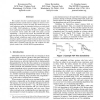Free Online Productivity Tools
i2Speak
i2Symbol
i2OCR
iTex2Img
iWeb2Print
iWeb2Shot
i2Type
iPdf2Split
iPdf2Merge
i2Bopomofo
i2Arabic
i2Style
i2Image
i2PDF
iLatex2Rtf
Sci2ools
DATE
2006
IEEE
2006
IEEE
Lock-free synchronization for dynamic embedded real-time systems
We consider lock-free synchronization for dynamic embedded real-time systems that are subject to resource overloads and arbitrary activity arrivals. We model activity arrival behaviors using the unimodal arbitrary arrival model (or UAM). UAM embodies a stronger “adversary” than most traditional arrival models. We derive the upper bound on lock-free retries under the UAM with utility accrual scheduling — the first such result. We establish the tradeoffs between lock-free and lock-based sharing under UAM. These include conditions under which activities’ accrued timeliness utility is greater under lock-free than lock-based, and the consequent upper bound on the increase in accrued utility that is possible with lock-free. We confirm our analytical results with a POSIX RTOS implementation.
Related Content
| Added | 10 Jun 2010 |
| Updated | 10 Jun 2010 |
| Type | Conference |
| Year | 2006 |
| Where | DATE |
| Authors | Hyeonjoong Cho, Binoy Ravindran, E. Douglas Jensen |
Comments (0)

